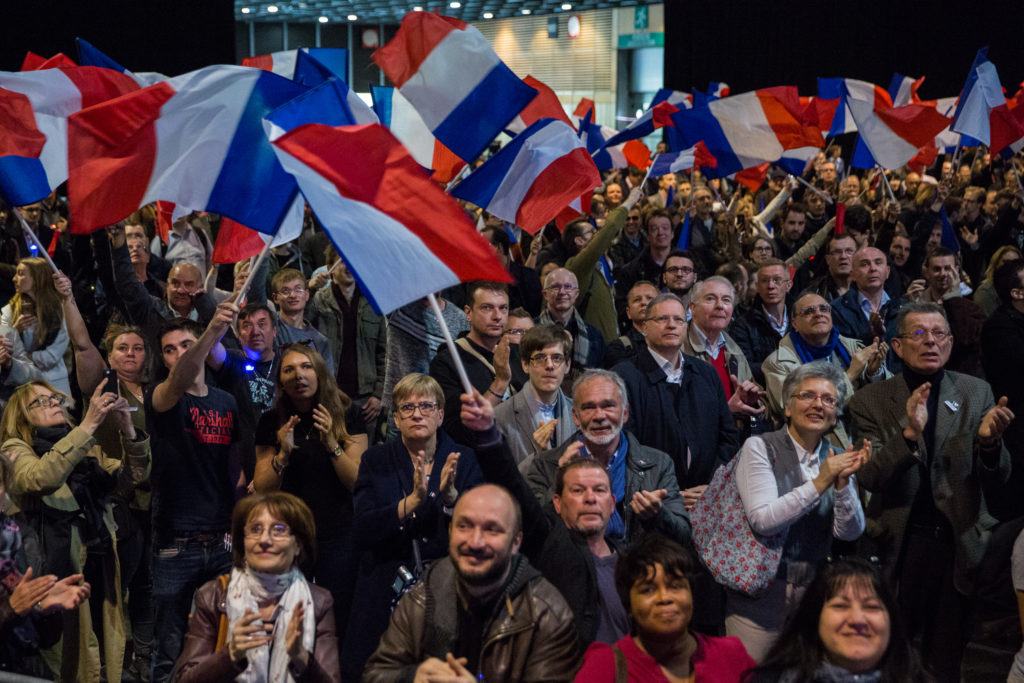All in the name: National Front party leader Marine Le Pen with her father Jean-Marie Le Pen. Credit: Patrick Bernard/ABACAPRESS.COM/PA Images

Ask any sensible French person what name the Front National (FN) needs to change in order to have a realistic chance of winning power and the answer will always be the same: Le Pen.
This is being made abundantly clear as the far-right party goes through a tortuous rebranding exercise. Its leader, Marine Le Pen, believes a kinder, more inclusive image will be the result if it calls itself Rassemblement National, which loosely translates as National Rally.
For Le Pen, the semantics are simple enough – “Front” evokes war; “Rally” signifies unity. She is convinced that her considerable achievement in winning 34 per cent of the popular vote in the final round of last year’s presidential election could be bettered if the FN appealed to moderates.
They would win more parliamentary seats (they only have six at the moment, along with two affiliated MPs), and generally step up from being a highly effective outlet for xenophobic sentiment into a serious electoral force.
In fact, such a strategy is hopelessly flawed. The most overtly aggressive party in France’s postwar history was built on hateful extremism – the kind personified by its founder, Jean-Marie Le Pen, and indeed his equally bellicose daughter and heiress, Marine Le Pen.
It was in 1972 that Le Pen senior, a former soldier, created the FN out of his inner circle of thugs furious about decolonisation. They were particularly resentful about the loss of Algeria, the jewel in France’s empire for 132 years up until the North African country won independence in 1962 following a horrifically bloody war. Le Pen was said to have used torture as an intelligence officer during the conflict – a claim that he has repeatedly denied to me in interviews, but one that has inevitably endeared him to ultra nationalists.

These are the same sort of people who are drawn to the FN’s strong links with Vichy France, and those who collaborated with the Nazis during Germany’s wartime genocide. Le Pen is himself a convicted racist, anti-Semite and Holocaust denier, and remains hugely popular with grassroots FN supporters.
They view him not as a demonic bigot but as the man who himself came close to winning the French presidency in 2002, when he was runner-up to Jacques Chirac. In this sense, there was nothing new in Marine Le Pen’s limited success last May.
There is a highly vocal constituency in France which is prepared to accept inciting racial and religious hatred as part of the FN project – one that centres on the rejection of immigrants, and especially those from ethnic minority backgrounds.
The FN’s problem is that these voters have never amounted to a significant majority. Their “breakthrough” year of 1986 – when the FN Group won 35 seats out of 577 in the National Assembly – has not been repeated, let alone improved upon. Instead the party myth has been carried on by high-profile individuals, all of them called Le Pen.
FN loyalists are mainly spread across declining industrial areas in the north of France, and parts of the south where there are few jobs but also large African and North African communities who make easy scapegoats for the angry and the disillusioned.
Jean-Marie Le Pen was called the “Devil of the Republic” for a reason – he made political capital out of the despair felt by hundreds of thousands of so-called Pieds-Noirs (“Black-Feet”), members of a largely white colonial class who were forced to flee their prosperous lives in Algeria after the country became independent. They often had no choice but to move to council flats on the edge of major cities such as Paris and Marseilles, alongside the non-French immigrants they detested.
Les Trente Glorieuses – the 30 glorious years of French economic revival after the Second World War – had done little for the displaced Pieds-Noirs, many of whom had lost everything and thus harboured a deep sense of betrayal. As alienation intensified, they harked back to an ancient France of pugilistic Catholicism – one reflected in the FN’s devotion to Joan of Arc, saint and heroine of the Hundred Years’ War against the English.

Others bemoaned society’s shift away from fascism, including the militaristic values that had underpinned public order when France was part of the Third Reich. An increasingly liberal society continues to appal the FN faithful as much as globalisation. This is why the Le Pens strive to pull up the drawbridge, so as to bypass the international economy and replace it with a protectionist one.
There is a strong nihilistic element to everything the FN proposes. They are a party of dissent, and most of all rage. As its share of the vote fails to materialise as tangible gains, the FN blames the current lack of proportional representation in France. Most of all, propagandists say they are the victim of an antagonistic establishment – a deceit that is easily brushed away by the facts.
The reality is that it would be hard to find a family that better embodies the Paris political class than the Le Pens. The multi-millionaire dynasty has regularly proved itself to be as corrupt and self-serving as all other French politicians, whether from the Left or the Right.
When she was re-elected as leader, Marine Le Pen had just been indicted by prosecutors for distributing obscene images on Twitter of so-called Islamic State terrorists murdering captives – a crime that could see Le Pen imprisoned for three years. She is also implicated in on-going fake jobs and property scandals – the type that the notoriously arrogant French elite regularly tries to play down as the cases plod through France’s lethargic legal system. Le Pen denies any wrongdoing in all of the sagas.
While electoral losers are soon kicked off the political stage in countries such as Britain and America, they go on for ever in France. Le Pen’s defeat to Emmanuel Macron – the successful candidate for president who highlighted the FN’s economic illiteracy, among many other profound inadequacies – by no means ended Le Pen’s nepotistic career.
She was joined at the latest FN congress in Lille by Steve Bannon, credited with helping to formulate the alt-right agenda that swept Donald Trump to power in the US in November 2016 and who served as the president’s chief strategist for seven months.
Bannon was meant to be supporting Le Pen, as he told their audience:
“Let them call you racists…Let them call you xenophobes, let them call you nativists. Wear it as a badge of honour.”
Yes, such sentiments might have impressed the FN base in flyover France, but it certainly did not signal a new beginning. The party of 2018 is barely changed from the one of 1972, for the simple reason that it is still a closed shop built around the Le Pen family.
If the FN wants to stop being the vehicle for the glorification of such cynical rabble-rousers, it badly needs to drop their name.










Join the discussion
Join like minded readers that support our journalism by becoming a paid subscriber
To join the discussion in the comments, become a paid subscriber.
Join like minded readers that support our journalism, read unlimited articles and enjoy other subscriber-only benefits.
Subscribe